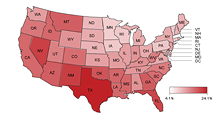Senate Dems push $848 billion health care bill
Top Democrats defend their proposal to extend health insurance coverage to 30 million additional more Americans at a cost of $848 billion over 10 years.

WASHINGTON (CNN) -- Top Senate Democrats are preparing to defend their sweeping health care reform bill Thursday, one day after unveiling the measure on a sharply polarized Capitol Hill.
Senate Majority Leader Harry Reid and other Democratic leaders are slated to hold a noon news conference to discuss their proposal to extend health insurance coverage to 30 million additional Americans at an estimated cost of $848 billion over 10 years.
Reid and other Senate Democrats have cited an analysis by the non-partisan Congressional Budget Office for the coverage and cost figures. The CBO estimates the proposal would reduce the federal deficit by $130 billion over the next 10 years, through 2019. Any effect on the deficit in the following decade would be "subject to substantial uncertainty," but probably would result in "small reductions in federal budget deficits," according to the CBO.
According to Reid, the savings will be substantial.
"We're not going to add a dime to the deficit, in fact, quite the opposite," Reid said. "We'll cut the problems we have with money around here by as much as three-quarters of a trillion dollars."
President Barack Obama hailed what he called a "critical milestone" in the push to meet his top domestic priority for 2009.
"From day one, our goal has been to enact legislation that offers stability and security to those who have insurance and affordable coverage to those who don't, and that lowers costs for families, businesses and governments across the country," Obama said in a statement, adding that the Senate proposal "meets those principles."
The proposal drafted from two separate bills approved by Senate committees now goes to the full Senate, where Republicans have vowed to try to block it.
Reid, D-Nevada, needs to round up 60 votes in the 100-member Senate to overcome a certain GOP filibuster attempt and open the chamber's debate on the bill. It would take another 60 votes to close debate, while final approval of the bill would require only a simple majority.
Democratic leadership sources have said a Saturday vote to start debate is possible. It remains unclear, however, whether Democrats will have enough votes to fend off a filibuster. Even if they do, the ensuing debate is expected to last weeks, challenging the goal of Senate Democratic leaders to pass the bill by year's end.
Reid met with Senate Democrats late Wednesday afternoon, before a news conference with the party's Senate leaders. At the news conference, Reid touted that the proposal would provide health care to more Americans "in a fiscally responsible way," while Sen. Christopher Dodd, D-Connecticut, called the projected deficit reductions "real savings for Americans."
Sen. Tom Harkin, D-Iowa, who succeeded the late Sen. Edward Kennedy as chairman of the Senate Health, Education, Labor and Pensions Committee, expressed sorrow that Kennedy was not present to continue supporting "the cause of his life."
The 2,074-page Senate bill seeks to reduce the long-term costs of health care for the government, businesses and individuals, while reforming how services are delivered to increase efficiency and effectiveness. It includes controversial provisions such as a government-run public health insurance option unanimously opposed by Republicans. The bill would prohibit illegal immigrants from participating in a health insurance exchange created for those unable to afford health coverage, and would prohibit the use of federal funds for abortion coverage in the exchange, according to a briefing for journalists arranged by the Senate Democratic leadership.
According to the briefing, the bill includes a range of tax increases and new fees. The Medicare payroll tax on individuals earning $200,000 a year and couples earning $250,000 a year would increase by half a percentage point, from the current 1.45% to 1.95%. In addition, insurers providing costly health coverage -- known as "Cadillac" plans -- would face a 40% tax on policies worth more than $8,500 for individuals and $23,000 for families.
The bill also includes a 5% tax on the cost of elective cosmetic surgery, as well as new fees for insurers and pharmaceutical manufacturers. The total projected revenue raised by all the taxes and fees would exceed $200 billion.
The bill would require individuals to buy health insurance, with a fine for non-compliance of $95 in the first year that would escalate to $750 by 2016. Parents would be responsible for providing coverage for children up to age 18.
Unlike the House version, the Senate bill does not mandate that all employers offer health care. Businesses with more than 50 workers, where at least one employee qualifies for government subsidies, would face a penalty of $750 for every full-time employee if it does not offer health care coverage.
The Senate bill also would expand government-run Medicaid coverage for the poor to everyone making less than 133 % of the national poverty level.
Earlier Wednesday, Reid met with Sens. Mary Landrieu of Louisiana, Blanche Lincoln of Arkansas and Ben Nelson of Nebraska -- three moderate Democrats who have expressed concerns about the cost and scope of health care reform proposals.
The trio will play a pivotal role in the success or failure of health care reform in the Senate. If Republicans stay unified in opposition to the health care bill, Reid would need the support of all 58 Senate Democrats, as well as independent Sens. Bernie Sanders of Vermont and Joe Lieberman of Connecticut to reach the 60 votes necessary to overcome a filibuster.
Landrieu told CNN she has concerns relating to the bill's costs to small businesses and individuals. She also expressed opposition to a public health insurance option "that will undermine the private insurance market." If that's included in the measure, she said, "it needs to come out at some point."
She said, however, that Reid gave her multiple "assurances ... that he's working hard toward those goals."
Nelson released a statement Wednesday noting that the likely weekend vote represents an opportunity "to commence debate and an opportunity to make changes" to improve the bill.
A source close to Nelson indicated that the Nebraska senator might be willing to vote to start debate, even if he doesn't support everything that's in the bill.
Landrieu, Lincoln and Nelson have all indicated they want a chance to read the CBO-scored bill before deciding whether to back a vote starting debate.
Reid has spent the past several weeks melding bills passed by two Senate committees. A version passed by the House -- by a 220-215 vote -- was crafted by Democratic leaders who merged legislation from three House committees.
The House measure is projected to cost more than $1 trillion over the next 10 years.
If the Senate manages to pass a bill, a congressional conference committee would need to merge the House and Senate proposals into a consensus version requiring final approval from each chamber before moving to Obama's desk to be signed into law.
Democratic leaders in both chambers have been wrestling with the most contentious issues, including abortion and immigration, as well as how to pay for reform. The House bill has more restrictive abortion language, and includes a 5.4 income tax surcharge on individuals making more than $500,000 and couples earning more than $1 million.
Both bills have the public option, but the Senate version allows states to opt out before the national program would go into effect in 2014.
The two bills are virtually identical on a broad range of changes, including creating health insurance exchanges, expanding Medicaid, subsidizing insurance for low- and some middle-income families, and capping out-of-pocket medical expenses, while preventing insurance companies from denying coverage for pre-existing conditions.
Insurers under both plans would be barred from charging higher premiums based on a person's gender or medical history.
CNN's Ted Barrett, Deirdre Walsh, Lisa Desjardins and Dana Bash contributed to this report. ![]()



